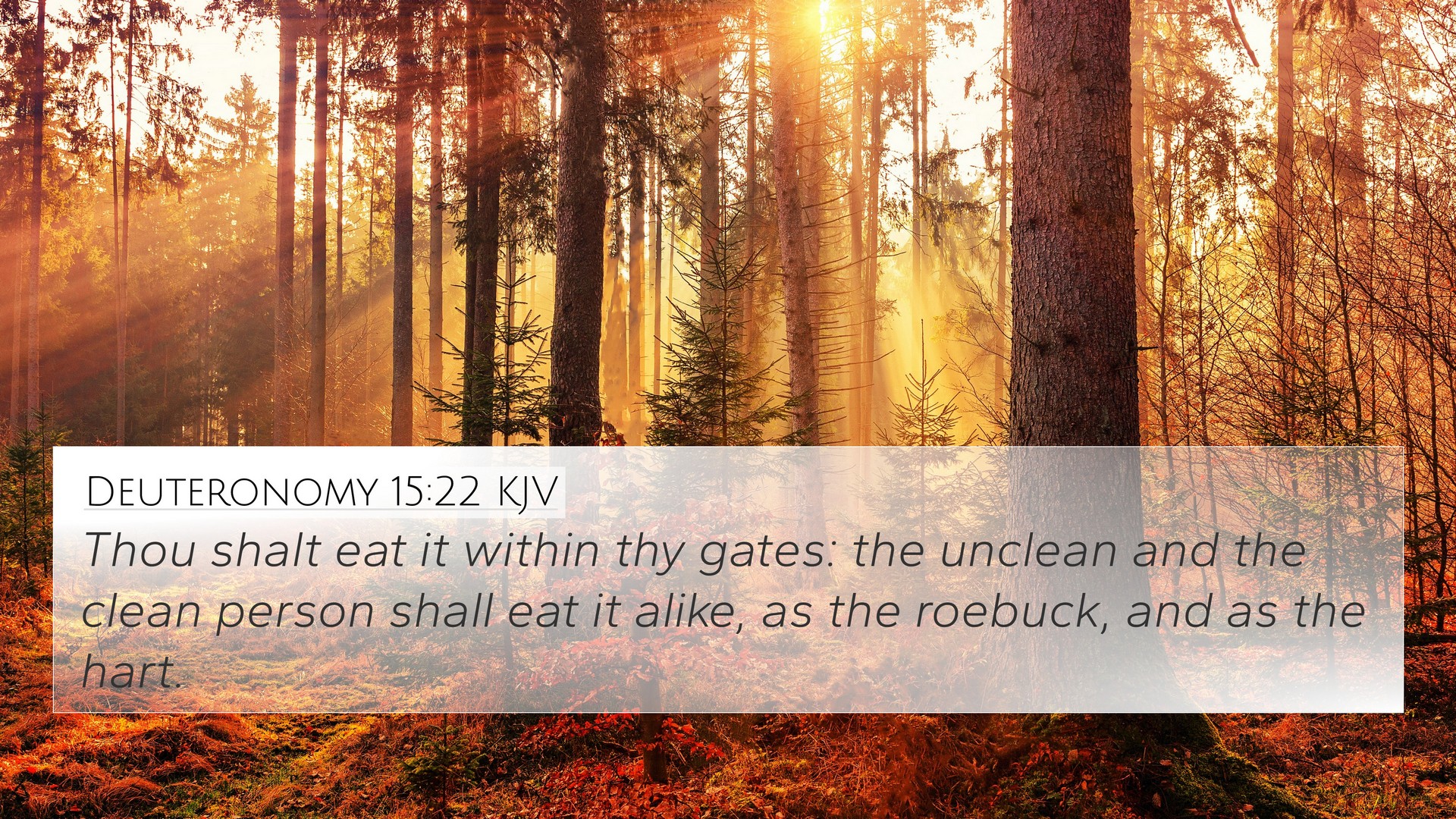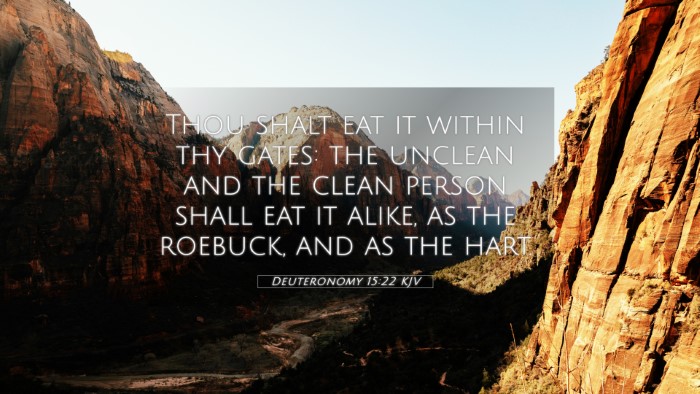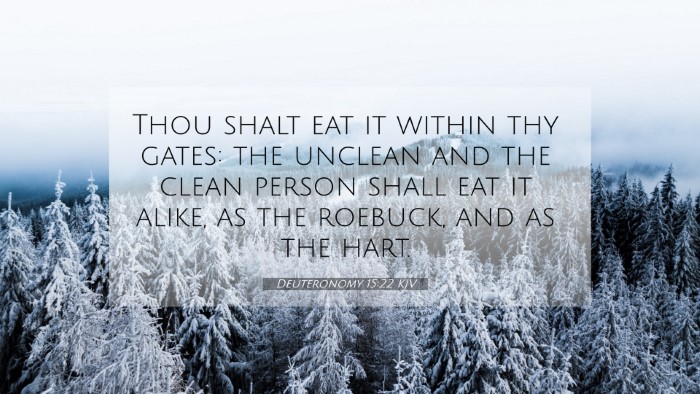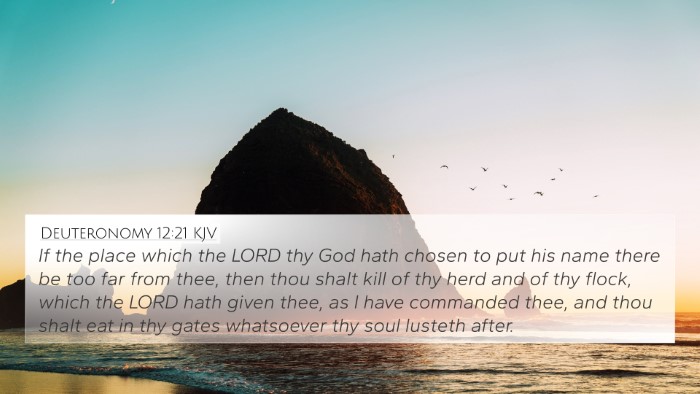Understanding Deuteronomy 15:22
Bible Verse: Deuteronomy 15:22 - "You may eat them within your gates: the unclean and the clean alike may eat them, as the roebuck and the hart."
Overview of the Verse
This verse addresses the permissibility of consuming certain animals, emphasizing that both ceremonially clean and unclean individuals have the right to partake in the flesh of the animals mentioned, further illustrating the inclusivity of God's provision in ancient Israelite society.
Insights and Interpretations
The meaning of Deuteronomy 15:22 can be drawn from various public domain commentaries, all contributing unique perspectives that enrich our understanding:
-
Matthew Henry:
Henry emphasizes that this verse illustrates God's concern for both the spiritual and physical well-being of His people. By permitting consumption of certain animals, He demonstrates His provision while underscoring the importance of cleanliness and holiness in their dietary practices.
-
Albert Barnes:
Barnes notes that this provision indicates a level of grace and mercy in the law, allowing freedom in dietary choices while maintaining an understanding of holiness. The mention of "within your gates" suggests community and shared participation in God's blessings.
-
Adam Clarke:
Clarke provides a deeper contextual analysis of the terms 'unclean' and 'clean,' explaining that these designations not only refer to dietary laws but also symbolize broader spiritual truths about separation from sin and disobedience.
Cross-Referencing Related Bible Verses
To fully grasp the themes presented in Deuteronomy 15:22, it's beneficial to draw connections with other Bible verses. Here are 10 related cross-references that enhance our understanding:
- Leviticus 11:4-8 - Details the laws concerning clean and unclean animals.
- 1 Timothy 4:3-5 - Discusses dietary practices and the sanctification of all foods through thanksgiving.
- Acts 10:12-15 - Peter’s vision clarifying the distinction of clean and unclean animals, signifying a new understanding of God’s laws.
- Matthew 15:11 - Jesus teaches that what goes into the mouth does not defile a person, reflecting a deeper principle of heart and intent.
- Romans 14:14 - Paul speaks to the issue of unclean foods and their implications in the Christian community.
- Isaiah 66:17 - Prophetic warnings against the unclean, linking dietary practices with spiritual states.
- Mark 7:19 - Jesus declaring all foods clean, reinforcing the idea of a transformed covenant.
- 2 Corinthians 6:17 - Encouragement for believers to separate from unclean things, resonating with the broader theme of holiness.
- Hebrews 9:9-10 - Mentions the ceremonial laws concerning foods which were symbolic of greater spiritual realities.
- John 6:35 - Jesus as the bread of life echoes the idea of spiritual sustenance beyond physical consumption.
Thematic Connections
The themes present in Deuteronomy 15:22 reflect broader theological concepts found throughout the Bible:
- Grace and Provision: God's continual provision for His people showcases His grace.
- Holiness and Community: The balance between individual dietary choices and communal practices speaks to the importance of maintaining holiness within community life.
- Transformation of the Law: With the coming of Christ, many interpretations of dietary laws evolve, revealing deeper spiritual truths.
- Inclusivity of God’s Blessings: The permission for all to partake reflects God's inclusive nature, welcoming all who seek Him.
Conclusion
Deuteronomy 15:22 serves as a reminder of God’s provision and encourages us to understand the deeper implications of His laws. Through the insights from commentaries, the connections with related verses, and the thematic exploration, we gain a richer appreciation of this scripture. It invites us to view our spiritual sustenance not just from a perspective of law, but through the lens of grace, community, and transformative faith.
Tools for Further Study
For those interested in exploring cross-references and gaining a deeper understanding of scripture, consider utilizing:
- Bible Concordance: A comprehensive resource to find verses based on keywords.
- Bible Cross-Reference Guide: A tool that aids in drawing connections between scripture passages.
- Cross-Reference Bible Study: Methods for studying scriptures in thematic clusters for deeper insights.
- Bible Reference Resources: Various books and online tools designed to support biblical study and research.
- Comprehensive Bible Cross-Reference Materials: Resources that provide detailed analyses of scripture correlations.




